Archive: 2025
A Guide to AI in Schools: Perspectives for the Perplexed
Comments Off on A Guide to AI in Schools: Perspectives for the PerplexedAnnouncing the Release of A Guide to AI in Schools: Perspectives for the Perplexed
by Dr. Julie M. Smith, Senior Education Researcher, Institute for Advancing Computing Education
Most new technologies, like laptops, are adopted in schools as the result of a deliberate policy choice. But generative AI is different: it is an arrival technology, which means that it arrived without formal adoption – students and teachers simply began using it. This arrival has left schools scrambling to respond to many challenges, including questions about academic integrity and data privacy. To assist with that response, IACE – in collaboration with MIT’s Teaching Systems Lab and Diamond Shoals Productions – has assembled a guidebook based on interviews with dozens of teachers, administrators, and students.

This guidebook is designed to support teachers and other school leaders as they determine what AI policies or guidelines to craft. Much about the implications of generative AI in education is still unknown, making it difficult to provide that guidance –despite how much it is needed. As Justin Reich, Director of MIT’s Teaching Systems Lab, noted,
“A guidebook of tying knots will show you exactly how to tie the knots the correct way. A guidebook on AI in schools in 2025 can’t possibly do that because we don’t even know what the knots are, let alone how to tie them. What we can show you is how people are taking this new kind of rope and bending it around in interesting ways, some of which might prove sturdy and some of which might prove faulty. And we won’t know which is which for a long time.”
This guidebook is not meant to be prescriptive or definitive. Rather, we envision it as akin to an invitation to observe a conversation in the teacher’s lounge about how teachers think about AI, what they are seeing in their classrooms, and what they’ve tried and how it went.
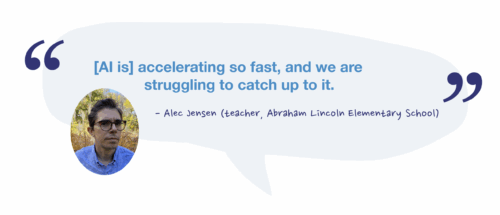
We include several case studies – we hope these will spark thought and discussion, allowing you to draw from other schools’ experiences. We also liberally excerpted statements from the interviews we conducted in order to center teachers’ voices in this conversation.
A Guide to AI in Schools: Perspectives for the Perplexed is designed to support teachers and other school leaders as they determine what AI policies or guidelines to craft. Please visit our webpage to access the guidebook.
Guidebook citation:
Julie M. Smith, Jesse Dukes, Josh Sheldon, Manee Ngozi Nnamani, Natasha Esteves, and Justin Reich (2025). A Guide to AI in Schools: Perspectives for the Perplexed. Retrieved from https://tsl.mit.edu/ai-guidebook/
Acknowledgements:
Interviews were supported by the Spencer Foundation, the Kapor Foundation, the Jameel World Education Lab, Google’s GARA program, the Social and Ethical Responsibilities of Computing initiative at MIT (SERC), and the RAISE initiative, Responsible AI for Social Empowerment and Education, also at MIT. This material is based upon work supported by the National Science Foundation under Grant No. 2219365. Haley McDevitt is the guidebook designer and illustrator.
What We Know about the Literacy Development of K-2 Black Boys?
Comments Off on What We Know about the Literacy Development of K-2 Black Boys?Literacy skills set the foundation for academic success. Unfortunately, systemic barriers can sometimes prevent students – including young Black boys – from developing their full potential as readers, writers, and speakers. In our recent project funded by Amazon and in partnership with the National Girls Collaborative Project, Dr. Rebekah Degener at University of Mankato, and Terysa Ridgeway from Terysa Solves It, we investigated literacy development of Black boys through a systematic literature review. Below, we present highlights of our recently published journal article: A Systematic Literature Review of Literacy Development of K-2 Black Boys.
Systematic Literature Review
We conducted a review of the academic literature in order to better understand the landscape of literacy development of Black boys in kindergarten, first, and second grades by answering the question: What does previous research indicate about how the U.S. education ecosystem fails K-2nd grade Black boy’s language arts interests and abilities?
Our search of three different academic databases and rounding out those searches with an expert consultation resulted in 46 studies. We considered how these studies were framed (that is, did they blame young students for systemic factors?), what topics they focused on, and what study results found.
What We Found
Our analysis identified seven key themes addressed across the literature:
- literacy skills assessment: some studies found the current assessments are appropriate for all children, while others did not
- the impact of the use of Black English: use of Black English did not harm literacy skills development
- inclusive and culturally relevant curricula: appropriate curricula can better support students’ skill development
- interventions and pedagogical approaches: a variety of interventions are represented in the literature and show promise, including the use of readers theater
- professional development: quality professional development emerged as a key factor in supporting students’ literacy development
- student engagement: some practices, such as prescriptive curricula, may inhibit student engagement; other practices, such as high expectations, can better support it
- the research agenda: our work confirms previous studies that indicate that, given the importance of the topic, there is an insufficient research base
Recommendations
Our recommendations support an asset-based approach that emphasizes the abilities of young Black boys to flourish academically when appropriate support is provided.
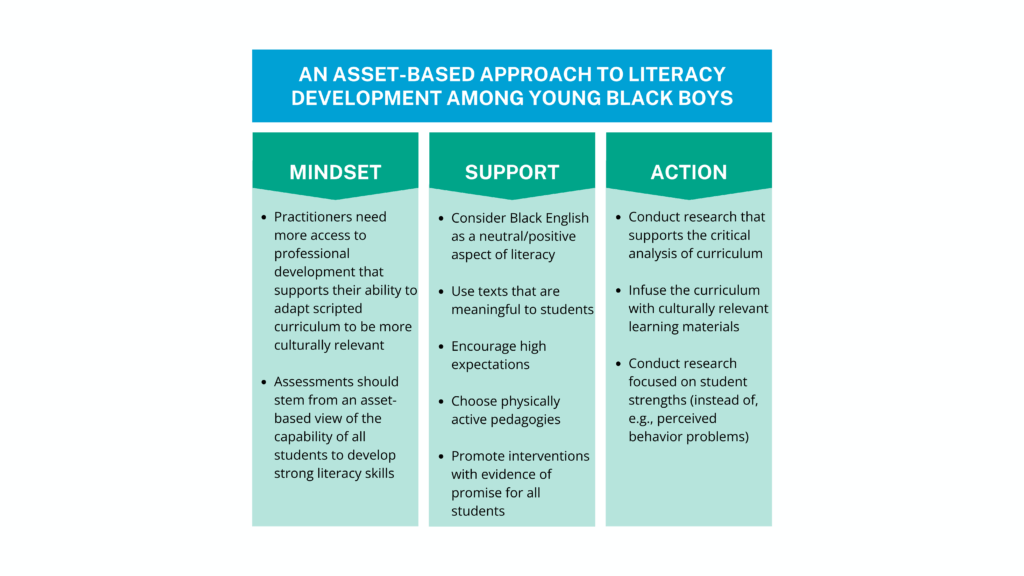
This asset-based approach involves more support for practitioners to adapt curriculum to meet the needs of all students. It also involves support for practitioners to adopt assessments that embody an asset-based viewpoint. Educators can better support young Black boys by viewing Black English as a neutral or positive aspect of literacy. In addition, using meaningful texts, encouraging high expectations, and choosing physically engaging pedagogies will engage Black boys. Our literature review also found that more research is needed, particularly research that focuses on leveraging students’ strengths.
Acknowledgement
This work was funded by Amazon Future Engineer.
Citation
Smith, J. M., Thigpen, L., Degener, R., & McGill, M. M. (2025). A Systematic Literature Review of Literacy Development of K-2 Black Boys. International Electronic Journal of Elementary Education, 17(3), 405–416. Retrieved from https://www.iejee.com/index.php/IEJEE/article/view/2416
Coaching to Support CS Teacher Development – Knowledge and Skills
Comments Off on Coaching to Support CS Teacher Development – Knowledge and SkillsMany teachers in the United States are just starting to learn how to teach computer science (CS). However, the majority do not have others nearby with CS teaching experience to provide support. Further, after educators complete CS professional development, there are few opportunities for individual feedback on their classroom practice and other means to support CS teacher development.
Piloting a Coaching Program
To address this gap, the Northern Lights Collaborative, CodeSavvy, and the Institute for Advancing Computing Education (IACE) piloted and studied the impacts of a one-year remote coaching program designed to provide individualized support to teachers. The coaching model used in this study is designed around the CSTA Standards for CS Teachers (CSTA, 2020) and accompanying resources and to focus specifically on teaching practices that meet students’ needs.
Our research question for this project was: How does teachers’ ability to apply CS practices and knowledge of CS concepts change after the coaching process?
We used a mixed-methods study that leveraged three primary forms of data from teachers who were coached (coachees) and teachers providing coaching (coaches): pre- and post-surveys, coaching logs, and self-reflection checklists.
Highlights
Coachees’ reported CS knowledge and skills related to Standard 1 were significantly higher than before intervention, indicating preliminary evidence that the intervention increased CS coachees’ reported knowledge and skills. Coachees also showed growth in their knowledge of CS concepts and ability to apply CS practices. Coaches provided encouragement, advice, suggestions, and reflective questions to help coachees grow in their ability to teach CS. In the survey, coachees’ rated their knowledge of and their abilities to apply CS concepts significantly higher after the intervention compared to before intervention.
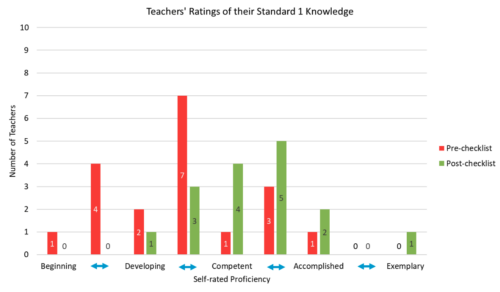
As more teachers continue to learn how to teach CS and hone their skills and practices, engaging these teachers in coaching can be powerful in improving their student’s learning. Professional development providers and regional education agencies (districts and schools) could leverage the processes formed through this intervention (which is based on professional development practices with solid evidence for positive impacts) to provide similar coaching to teachers just learning how to teach CS.
You can read our paper here. To cite this article, please use Rosato, J., Tise, J., Thigpen, L., Brunson, F. & McGill, M. (2025). Coaching as a Means to Support Teacher Development of Computer Science Knowledge and Skills. In Proceedings of SITE 2025 (pp. 1782-1792). Waynesville, NC USA: Association for the Advancement of Computing in Education (AACE). Retrieved March 20, 2025 from https://www.learntechlib.org/primary/p/225756/.
This material is based upon work supported by the U.S. National Science Foundation under Grant No. 2122511. Any opinions, findings and conclusions or recommendations expressed in this material are those of the author(s) and do not necessarily reflect the views of the National Science Foundation.
What Do We Know about How Data Is Used to Improve Interventions for Engineering Students?
Comments Off on What Do We Know about How Data Is Used to Improve Interventions for Engineering Students?Published by Julie Smith, PhD, IACE
The percent of engineering degrees awarded to people who have not typically pursued engineering has increased since 2010, indicating strides in broadening participation. But there is still substantial underrepresentation for women and people from racially and ethnically marginalized groups.
Using Data
Harnessing the power of data, including big data, can supporting broadening participation efforts in engineering. However, there are gaps in our understanding of how higher education faculty and staff use this data in the design of such interventions.
For research conducted as part of the Engineering PLUS Alliance funded by the National Science Foundation, we explored how different institutions may use data in the process of designing efforts to sustain and grow engineering programs. We analyzed surveys completed by and artifacts generated by higher education faculty and staff who participated in a structured professional development and research experience. The experience focused on planning and executing a data-driven project designed to improve equity in engineering education via the stEm PEER Academy led by Drs. Claire Duggan and Jennifer Love. We explored why and how participants plan to use data in their design of interventions
Highlights of our Findings
Of the 38 participants in the program, 34 consented to participate in the research process. Participants in the stEm PEER Academy generated artifacts related to their plan to recruit and retain all students in engineering education on their campuses. This generation phase occurred after approximately 20 hours of professional development in the program.
We performed a content analysis on these artifacts. As the table below shows, participants intend to collect, plan for the use of, use, and then analyze data. (Note that other possible categories – such as sharing and archiving data – were not found.) Participants plan to use data to define their challenges, proposed solutions, and impact measurement. The table also shows how common each combination of types of data use was.
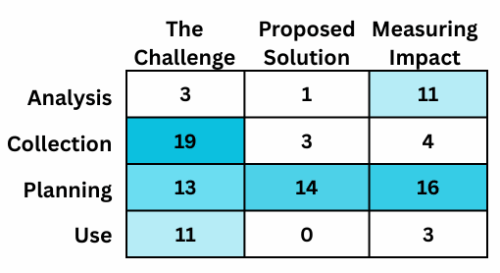
Understanding how participants used data is an important first step in determining how data use impacts project outcomes. Based on that finding, we can determine how to best support future cohorts as they design their interventions.
You can learn more about our work in our 2024 FIE paper: Data Use in the Design of Interventions to Improve Equity in Engineering Education.
To cite this work, please use Smith, J. M., Love, J., & Duggan, C. (2024, October). Data Use in the Design of Interventions to Improve Equity in Engineering Education. In 2024 IEEE Frontiers in Education Conference (FIE) (pp. 1-6). IEEE.
This work is supported by the National Science Foundation under award HRD-2119930. Any opinions, findings, and conclusions or recommendations expressed in this material are those of the authors and do not necessarily reflect the views of the National Science Foundation.
What do we know about engineering students who are parents?
Comments Off on What do we know about engineering students who are parents?Published by Julie Smith, PhD, IACE
About one-fifth of undergraduate students are parents, and these students are likely to differ somewhat from other students. However, little research has been conducted on engineering students who are parents.
For work conducted as part of the Engineering PLUS Alliance funded by the National Science Foundation, we explored data from the U.S. 2020 National Postsecondary Student Aid Study. We wanted to determine how engineering students who are parents differ from other engineering students. In this study presented at FIE 2024 in Washington, DC, our research question was:
How do engineering students who are parents differ from other engineering students?
We found that engineering students are far less likely than other students to be parents (6% v. 18%). Engineering students who are parents differ from other engineering students. They are more likely to be older, to be men, to be Black or African American, to have a job, to attend school part-time, and to attend a nonselective college or a two-year college. They are also more likely to have no funding for tuition other than a credit card and to experience food insecurity. Surprisingly, they are less likely to attend a school that offers child care.
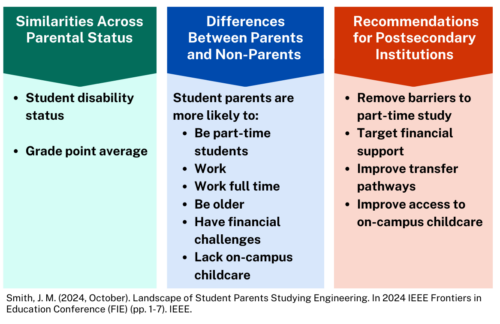
However, engineering students do not significantly differ with respect to their status as parents with regard to disability status or in their likelihood of having a high or low GPA. This final finding is particularly important. Research that analyzes the experiences of some groups – including student parents – often assumes a deficit framework. That is, the differences between groups may be assumed to stem from problems within some groups. This framing may cause problems if group members are blamed for the discrepancy between their performance and that of others, while their potential strengths are given little attention. Thus, we feel it is important to focus on strengths as well as challenges faced by student parents.
Our findings indicate that engineering students who are parents face unique challenges, such as financial insecurity. However, they also demonstrate notable strengths—for example, maintaining GPAs comparable to their peers despite the many demands on their time. Additionally, the high proportion of Black engineering students among student parents suggests that supporting this group more effectively could be a meaningful way to improve representation in engineering education.
Our goal is to study with engineering students to determine current barriers and how institutions can support those who are parents.
You can learn more about our work in our 2024 FIE paper, Landscape of Student Parents Studying Engineering. Cite this work as follows: Smith, J. M. (2024, October). Landscape of Student Parents Studying Engineering. In 2024 IEEE Frontiers in Education Conference (FIE) (pp. 1-7). IEEE.
This work is supported by the National Science Foundation under award HRD-2119930. Any opinions, findings, and conclusions or recommendations expressed in this material are those of the authors and do not necessarily reflect the views of the National Science Foundation.
